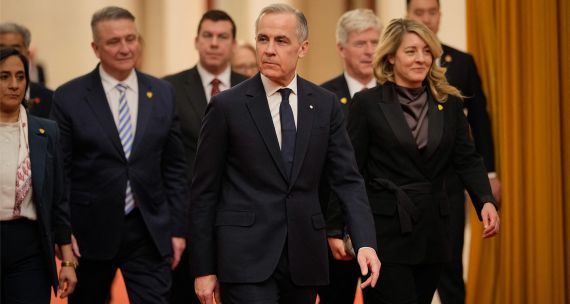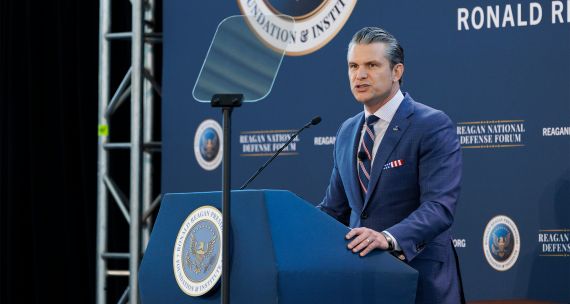Was the U.S.-China summit at Mar-a-Lago a bust? A whimper instead of a bang?
Certainly, on the surface, the meeting of Chinese President Xi Jinping and U.S. President Donald Trump in Florida earlier this month did not meet the expectations of the Fox News crowd. In fact, in the days leading up to the summit, both the Chinese and U.S. downplayed the likelihood of dramatic outcomes. In the end, it was overshadowed, in western media at least, by the U.S. cruise missile attack on the Shayrat airbase in Syria, and by President Trump being, well, presidential. The Chinese public saw a different event: media focus in China was on President Xi’s dignified and low-key self-assurance.
The scripted quality of the meeting belied what, in fact, was the importance of this first scene of the next act of the complex China/U.S. relationship, at a crossroads of China’s unambiguous assertion of great power status, and an America that hasn’t quite decided how to deal with it. Not surprisingly perhaps, there was no joint statement nor joint press conference, each side providing its own comments on the outcomes of the talks.
There were outcomes. By all accounts from the U.S. and China, Trump and Xi did establish a working relationship of sorts, yet to be tested, perhaps, but one that facilitated a subsequent phone call on the most vexing issue of North Korea’s nuclear and missile programs.
A new U.S.-China Comprehensive Dialogue is in place to address diplomatic and security issues, economic relations, law enforcement and cyber-security, and social and cultural issues. Headed as it is by the two hyper-busy presidents, and dependent on a plethora of cabinet ministers and bureaucracies, experienced bureaucrats and policy wonks will have doubts about the efficacy of such grand, led-by-the-top approaches.
Perhaps more productive will be 'the hundred day plan' to address trade imbalances. Trump's fire-and-brimstone pronouncements on China's management of its economy will have to be replaced with real-world issues and negotiations. For starters: the U.S. administration needs to decide whether it wants changes in Chinese economic policies or changes in bilateral trade outcomes. Probably both, but the delivery horizons for each will be very different.
The most vexing, and dangerous, issue is how to deal with the Democratic People's Republic of Korea. U.S. objectives are clear and stated: the denuclearization of North Korea and the elimination of ballistic-missile threats to the U.S. and to its allies. Chinese objectives are equally clear and baldly stated: nuclear fallout cannot be allowed to contaminate northeast China; the situation in the DPRK cannot lead to a large outflow of refugees; China cannot allow a hostile government in Pyongyang; and, Beijing cannot allow a U.S. military push towards the Yalu River. Seemingly, the U.S. position is strategic; China's position is damage limitation.
But the immediate objectives converge. The cost-benefit of China's support of North Korea and the Kim family is shifting. China's grand objective is the progressive assertion of political and military dominance in Asia, and the concomitant reduction of U.S. influence.
The DPRK is the major impediment to that, as its missile and nuclear tests and its over-the-top propaganda cement American alliances with the Republic of Korea and Japan. The U.S. administration has no intention of withdrawing from Asia and handing it to the Chinese, and a nuclear threat is existential and cannot be allowed.
DPRK discussions at Mar-a-Lago at a minimum served to educate the notoriously un-read Trump. The New York Times reported that Xi provided "a compressed seminar on Chinese-DPRK relations," which led President Trump to say, about managing the DPRK, that "after listening for 10 minutes, I realized it's not so easy."
Who knew? It would appear from this and other reports that the upper reaches of the U.S. administration have a better idea of the immeasurable collateral disaster that would accompany a pre-emptive strike on North Korean facilities. But discussions and the situation on the ground in DPRK have also led China to put Kim Jong-un on notice that his nuclear program has to be reined in, and for the first time has threatened to "severely limit" oil shipments, without which the DPRK economy would collapse.
What is Canada's stake in the U.S.-China relationship? Plenty.
Peace and security
The size and extent of the relationship between the U.S. and China, and the management of inevitable tensions between such different polities clearly have global significance. Trudeau père spoke of sleeping next to an elephant, but given our trans-Pacific interests, we are now dealing with two of them.
Our largest immigrant flows come from Asia. Half of our non-U.S. bilateral trade—$120-billion in 2016—is with the five largest economies of Asia, from Greater China to Australia to India. All of this traverses the adjacent seas or straits, or flies over them. Any disruption is a negative for Canada. And it doesn't take a war: see the impact on Asian tourism to Canada of the SARS epidemic in 2003. A hot conflict on the Korean peninsula would also force the government of Canada to decide on a response beyond the rhetorical.
Trade and the economy
This can cut both ways for Canada. The U.S. wants balanced trade in the form of a reduction of China's $300-billion-plus annual surplus ($54-billion in January/February alone). This basically means addressing China's industrial policies, weak intellectual property protection, restrictions on investment in key sectors, as well as the lack of transparency and disruptive interference at the local levels. The Chinese also have their wants: fewer investment restrictions in the U.S., access to civilian and dual-use technologies, and market economy status at the WTO.
Canada would benefit from the U.S. asks. But should Chinese shorter-term commitments—through voluntary export restraints or shale-gas contracts—not satisfy the U.S. administration, unilateral measures such as a border adjustment tax and other market-closure measures would slip into a trade war and seriously damage the WTO on which Canada's fundamental trade policies and strategies rest, not to speak of collateral damage should some measures affect Canada directly.
Trumpism unleashed on China would produce benefits of sorts for Canada: a national profile of being "the reasonable North Americans," attracting more Chinese tourists, more students, and accelerating Chinese interest in a bilateral trade agreement.
Some of these effects are already evident, for example in the number of students expressing interest in Canadian universities. It is much more preferable, however, to gain all of these advantages absent unmanageable tension between the world's two superpowers. Whatever else Canada's counter-strategies can offer, they can't change geography.
This piece was first published April 26, 2017 in The Hill Times.



